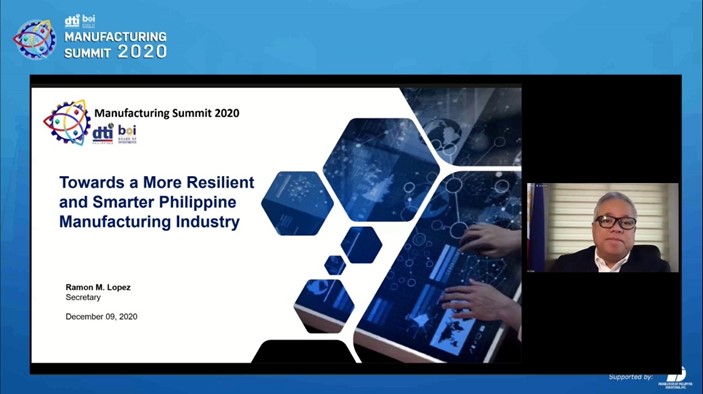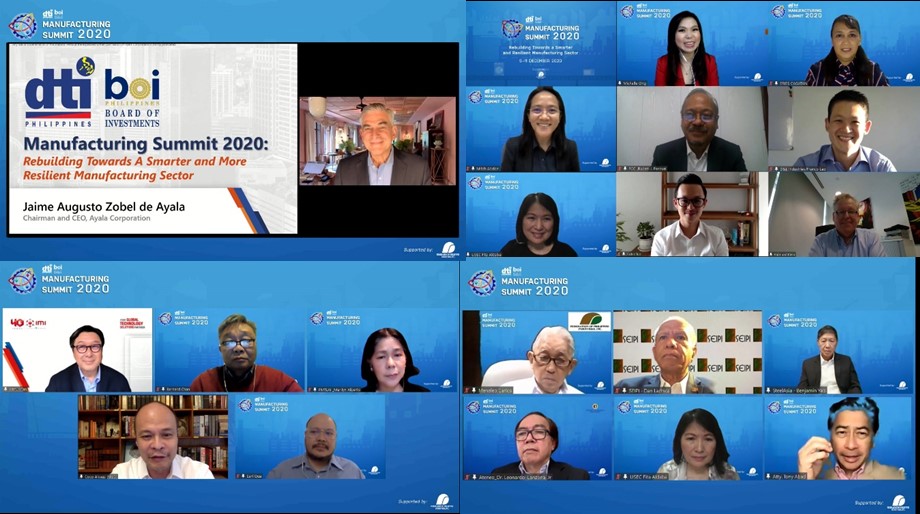MAKATI, Philippines – As the country’s enterprises recover from the adverse impact of the COVID-19 pandemic, the Department of Trade and Industry (DTI) is pushing for building the resilience of the country’s industries by making Philippine manufacturing smarter. This was the theme of the recently concluded virtual Manufacturing Summit 2020, DTI’s annual gathering of key stakeholders from the public and private sectors to review the performance of the country’s manufacturing sector and consider ways forward in its development.

“Innovation in our industries will be key to sustained competitiveness and development in the ‘New Normal’. The silver lining with the pandemic is that it is catalyzing the adoption and utilization of advanced digital technologies among our enterprises,” Trade Secretary Ramon Lopez said.
He added: “We need to stay the course to sustain the resurgence of local manufacturing, which should involve the digital transformation of our industries. To be resilient, Philippine manufacturing must evolve – faster, better, and smarter.”
The Summit covered discussions on government policies and programs to renew the national economy; future-proofing the country’s manufacturing enterprises through new business models and robust supply chains; and accelerating technology adoption and innovation among Philippine enterprises.
Aside from featuring speakers from DTI, including Competitiveness and Innovation Group Undersecretary Rafaelita Aldaba and Industry Development and Trade Policy Group Undersecretary and Board of Investments Managing Head Ceferino Rodolfo, the Summit featured presentations by experts from Deloitte Southeast Asia, McKinsey Singapore, Siemens, TÜV SÜD, the United Nations Industrial Development Organization, and the World Bank.
From the perspective of the private sector, Ayala Corporation Chairman and CEO Jaime Augusto Zobel de Ayala highlighted that “both the public and private sectors will have vital roles to play, not only in rebuilding the country’s manufacturing capacity but also in transforming it for greater global relevance.”
“The private sector can complement and support the government’s efforts to build a strong and sustainable manufacturing base by creating new jobs aligned with the post-pandemic economy, helping reskill the workforce, and localizing the high-value, complex capabilities required for long-term national competitiveness,” he added.
Across the Summit’s three sessions, major themes were brought to the fore. First is the importance of government support in fostering innovation among the country’s enterprises and ensuring an enabling policy environment for the manufacturing industry towards promoting technology investment, adoption, and utilization.
Second is the importance for firms to accelerate their digitalization, adopt flexible and adaptive business operations, and enhance the capacities and skills of their workforce through existing advanced technologies and new business models in order to be more competitive, resilient, and more productive in the post-pandemic future.
And third is that the collaboration among government, industry, and the academe will be key to facilitating the digital transformation of local enterprises and will be crucial to better prepare the country’s industries and workers for future disruptions.

The Summit also highlighted the significant opportunities that await Philippine enterprises under the recently signed Regional Comprehensive Economic Partnership (RCEP) and the anticipated enactment of the Corporate Recovery and Tax Incentives for Enterprises (or CREATE) bill.
“The signing of RCEP came at such an opportune time as the agreement is in line with the country’s initiatives and reforms in building a more robust and conducive investment and business environment amidst and post COVID-19,” Sec. Lopez said.
“RCEP will broaden the Philippines’ economic engagements with its trading partners through improved trade and investment, enhanced transparency, integrated regional supply chains, and strengthened economic cooperation. Furthermore, it will complement our ongoing programs and policies to make the country a manufacturing and investment hub in the region,” he also explained.
The trade chief emphasized that micro, small, and medium enterprises (MSMEs) will benefit the most from CREATE, as it provides for an immediate 10% reduction in the corporate income tax (CIT) rate, bringing it down to 20% (from 30% at present), specifically for domestic corporations with total assets, excluding land, of not more than P100M and net taxable income of P5M and below. For domestic corporations with a net taxable income of more than P5M, foreign corporations, and non-resident foreign corporations will still benefit from the outright 5% reduction in the CIT rate beginning July 2020.
“We look forward to maximizing the opportunities presented by CREATE and RCEP in the years ahead,” the Trade Secretary stated.
Undersecretary Aldaba concluded the Summit by reemphasizing the significance of embracing Industry 4.0 through the use and adoption of new technologies to strengthen the competitiveness, resilience, and sustainability of Philippine industries. She also stressed the need for companies to innovate, integrate into the digital economy, form industry clusters, and pursue global and regional collaboration.
Likewise, she highlighted the importance of reskilling and upskilling the workforce, as well as the necessity of strengthening government-academe-industry collaboration to address the challenges and make the most of opportunities brought about by technological developments.
Watch the recording of the Summit livestream via the DTI CIG Facebook page: https://www.facebook.com/DTI.CIG ♦
Date of Release: 22 December 2020



